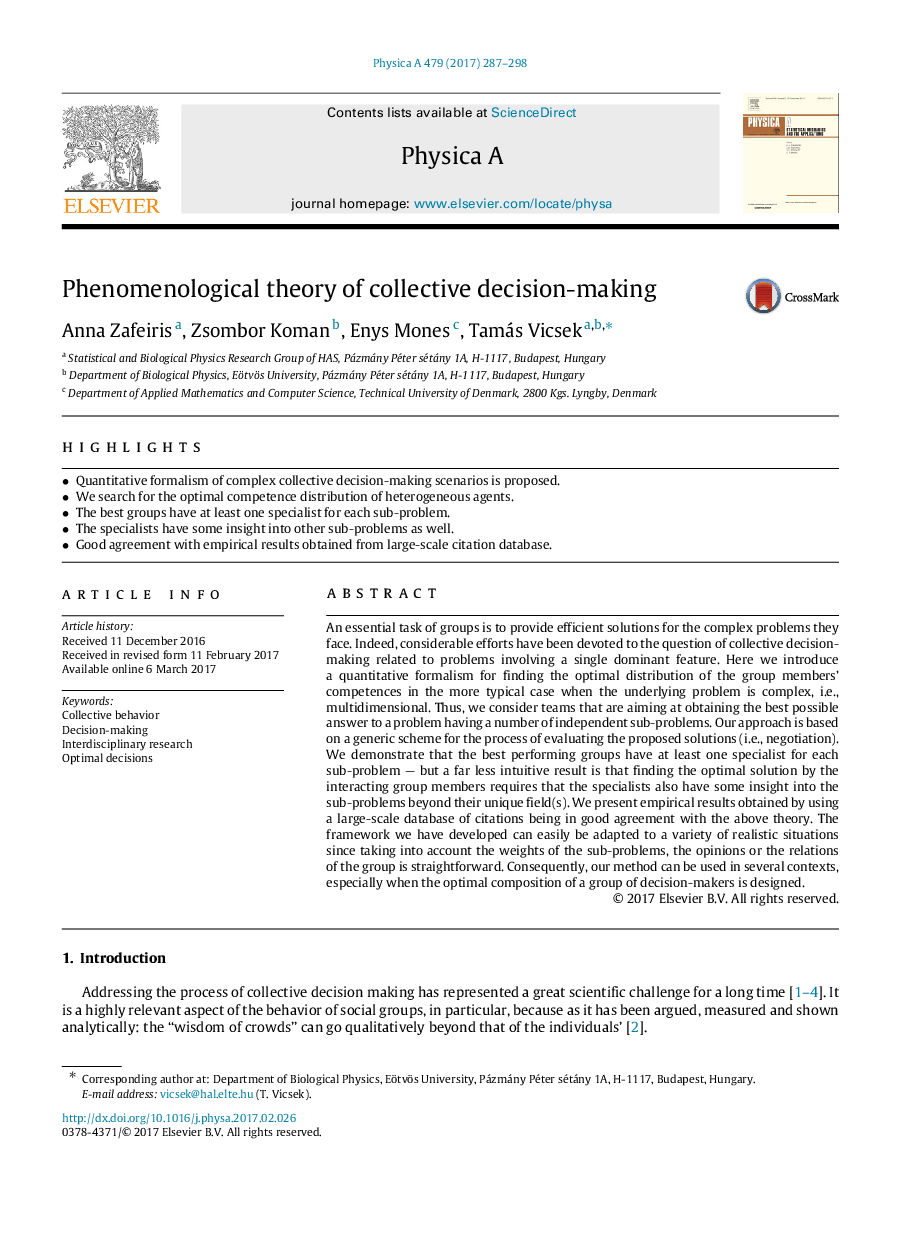| کد مقاله | کد نشریه | سال انتشار | مقاله انگلیسی | نسخه تمام متن |
|---|---|---|---|---|
| 5103010 | 1480094 | 2017 | 12 صفحه PDF | دانلود رایگان |
عنوان انگلیسی مقاله ISI
Phenomenological theory of collective decision-making
ترجمه فارسی عنوان
تئوری پدیده شناسی تصمیم گیری جمعی
دانلود مقاله + سفارش ترجمه
دانلود مقاله ISI انگلیسی
رایگان برای ایرانیان
کلمات کلیدی
رفتار جمعی، تصمیم سازی، تحقیق بین رشته ای، تصمیمات بهینه،
ترجمه چکیده
یک وظیفه ضروری گروه ها، ارائه راه حل های موثر برای مشکلات پیچیده ای است که آنها با آن روبرو هستند. در واقع، تلاش های قابل توجهی در مورد مسئله تصمیم گیری جمعی در رابطه با مسائل مربوط به یک ویژگی غالب وجود دارد. در اینجا یک فرمالیتسیسی کمی برای یافتن توزیع بهینه از توانایی های اعضای گروه در موارد معمول تر زمانی که مشکل اساسی پیچیده است، یعنی چند بعدی، معرفی می کنیم. بنابراین، تیم هایی را در نظر می گیریم که به بهترین نحو ممکن پاسخ به یک مشکل را با تعدادی از مشکلات زیربنایی مستقل دارند. رویکرد ما بر اساس یک طرح عمومی برای روند ارزیابی راه حل های پیشنهادی (یعنی مذاکره) استوار است. ما نشان می دهیم که بهترین گروه های دارای حداقل یک متخصص برای هر زیرمجموعه هستند - اما نتیجه بسیار کمتر بصری این است که یافتن راه حل بهینه توسط اعضای گروه تعامل، نیاز به این دارد که متخصصان نیز درک مشکلات زیر را فراتر از خود فیلد منحصر به فرد (ها). ما نتایج تجربی را که با استفاده از یک پایگاه داده گسترده ای از نقل قول ها در توافق خوب با نظریه فوق حاصل می شود ارائه می دهیم. چارچوبی که ما توسعه داده ایم می توان به راحتی به شرایط مختلف واقع گرایانه اقتباس کرد، زیرا با توجه به وزن های زیر مشکل، عقاید و روابط گروه ساده است. در نتیجه، روش ما می تواند در زمینه های مختلف مورد استفاده قرار گیرد، به ویژه هنگامی که ترکیب مطلوب گروه تصمیم گیرندگان طراحی شده است.
موضوعات مرتبط
مهندسی و علوم پایه
ریاضیات
فیزیک ریاضی
چکیده انگلیسی
An essential task of groups is to provide efficient solutions for the complex problems they face. Indeed, considerable efforts have been devoted to the question of collective decision-making related to problems involving a single dominant feature. Here we introduce a quantitative formalism for finding the optimal distribution of the group members' competences in the more typical case when the underlying problem is complex, i.e., multidimensional. Thus, we consider teams that are aiming at obtaining the best possible answer to a problem having a number of independent sub-problems. Our approach is based on a generic scheme for the process of evaluating the proposed solutions (i.e., negotiation). We demonstrate that the best performing groups have at least one specialist for each sub-problem - but a far less intuitive result is that finding the optimal solution by the interacting group members requires that the specialists also have some insight into the sub-problems beyond their unique field(s). We present empirical results obtained by using a large-scale database of citations being in good agreement with the above theory. The framework we have developed can easily be adapted to a variety of realistic situations since taking into account the weights of the sub-problems, the opinions or the relations of the group is straightforward. Consequently, our method can be used in several contexts, especially when the optimal composition of a group of decision-makers is designed.
ناشر
Database: Elsevier - ScienceDirect (ساینس دایرکت)
Journal: Physica A: Statistical Mechanics and its Applications - Volume 479, 1 August 2017, Pages 287-298
Journal: Physica A: Statistical Mechanics and its Applications - Volume 479, 1 August 2017, Pages 287-298
نویسندگان
Anna Zafeiris, Zsombor Koman, Enys Mones, Tamás Vicsek,
